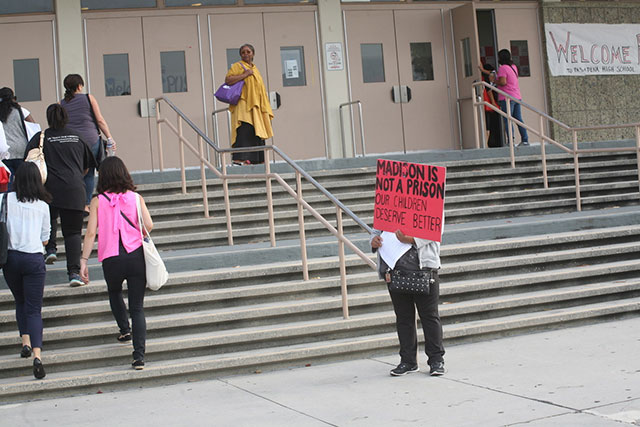
Honest, paywall-free news is rare. Please support our boldly independent journalism with a donation of any size.
“Few things are more corrosive to public education than knowing that an educational leader cheats and gets away with it because his school district condones and covers up his cheating,” said attorney Dale Gronemeier, at a Pasadena Unified School District board meeting on October 27. At the meeting, Gronemeier presented a 93-page white paper, co-written by himself and Elbie Hickambottom, Jr., that outlines the cheating that they allege took place at Pasadena’s Roosevelt Elementary School in 2010 and 2011, which was at the time under the direction of Principal Juan Ruelas. It was not the first time the Pasadena school board heard such allegations.
Gronemeier and Hickambottom represent the Citizen’s Council for Equality and Justice at Madison Elementary School (CCEJAM). Madison Elementary is another school in the city where Ruelas is now principal. He was appointed to the position in May 2015 by Superintendent Brian McDonald without any input from school stakeholders.
Pasadena Now reported that Assistant Superintendent Mercy Santoro said Ruelas “was assigned to the underperforming Madison [school] by Superintendent McDonald based on Ruelas’ ‘proven successful record’ after he improved Roosevelt Elementary School.” Ruelas has worked for the district for 20 years.
CCEJAM charges that the placement of Ruelas was “discriminatory against the Latino students, faculty, parents and community that is served by Madison.” Previous vacancies were filled by selection panels. The superintendent has characterized Madison as a low-performing school. Socioeconomically, it has a unique set of challenges. Ninety-five percent of students qualify for free or reduced lunch and 71 percent are English-language learners (ELL). The school has the highest percentage of Latino students in the district.
CCEJAM began to organize against Ruelas shortly after he was put in the position. According to the group, Ruelas not only orchestrated cheating on standardized tests, but he also used intimidating tactics toward teachers and staff at both schools. Ruelas did not respond to a request to be interviewed for this story. As Gronemeier and Hickambottom write, “The initial opposition to Dr. McDonald’s unilateral selection of Mr. Ruelas was then compounded by Mr. Ruelas’ management style, which critics describe as that of a bull in a China shop.”
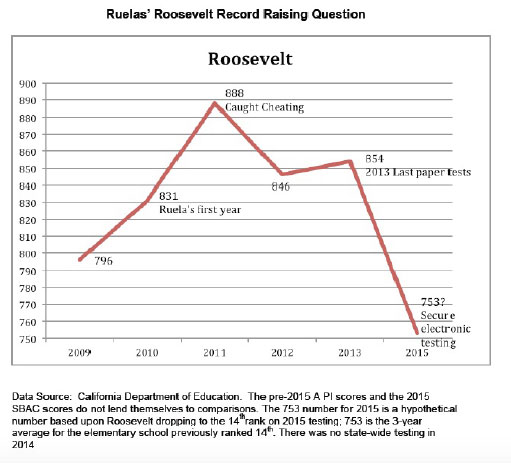 This graph shows Roosevelt Elementary School’s API scores from 2009-15, the years that Principal Juan Ruelas presided over the school. (Image: CCEJAM white paper) The Failure of No Child Left Behind
This graph shows Roosevelt Elementary School’s API scores from 2009-15, the years that Principal Juan Ruelas presided over the school. (Image: CCEJAM white paper) The Failure of No Child Left Behind
Administrator-led cheating has been plaguing public schools around the country since federal policies shifted to put greater significance on standardized testing. No Child Left Behind (NCLB), which was signed into law by George W. Bush in 2002, greatly expanded the federal government’s role in education. Its new rules required that states bring all students to the “proficient level” in math and reading by the 2013-14 school year. This mandate substantially changed the ways in which states addressed education, even though, as Education Week writes, “each state got to decide, individually, just what ‘proficiency’ should look like, and which tests to use.” States that did not comply with the requirements risked losing Title I money and were subject to increasing sanctions, such as having staff replaced or schools restructured.
According to David Berliner, Regents’ Professor of Education Emeritus at Arizona State University and National Education Policy Center fellow, this is where incentives for cheating come in. “Testing kids to see how they’re doing is a fine thing to do,” Berliner says. “It’s when you attach high stakes or hold teachers accountable that the whole thing falls apart.”
NCLB never quite operated the way it was intended, nor did federal education spending ever reach the levels spelled out in the law. By 2015, no state had gotten all of its students to the proficiency level. In 2011, Obama began offering states a waiver to NCLB standards if they instead pledged to meet other administration-approved education requirements. By mid-2012, more than half of states had been granted such waivers. Many opted for the Common Core State Standards, which were adopted by California in 2010.
In December 2015, Obama signed into law the Every Student Succeeds Act (ESSA), which is intended to decrease federal involvement in public schools and afford states greater agency over their curriculums. ESSA goes into effect in the 2017-18 school year; states are now in a transitional period. The new law requires states to test students in math and reading every year in grades 3 through 8, and once in high school.
Cheating Allegations at Pasadena’s Roosevelt Elementary School
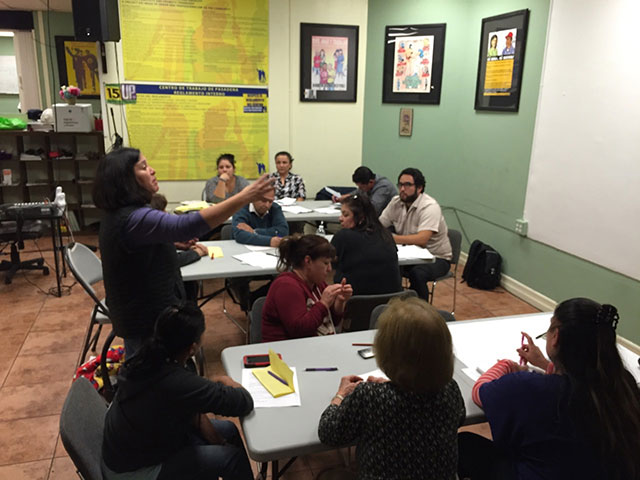 Gary Carnow, who was PUSD’s Chief Technology Officer, wrote in a September 2, 2011 email to six PUSD administrators, “There will be no Georgia issues found in California.” (Photo: CCEJAM white paper)
Gary Carnow, who was PUSD’s Chief Technology Officer, wrote in a September 2, 2011 email to six PUSD administrators, “There will be no Georgia issues found in California.” (Photo: CCEJAM white paper)
Ruelas was hired as principal at Roosevelt in 2009. He inherited a school that had an Academic Performance Index (API) of 790. Academic Performance Index was the indicator California used at the time to measure year-to-year academic growth. (In September of this year, the state announced a new school accountability system slated for use in early 2017.) In 2010, Roosevelt’s API grew to 831, and then to 888 in 2011. API was scored on a range from 200 to 1,000. According to the California Department of Education website, state requirements specified that an elementary school “must increase its API score by 5 percent of the difference between the school’s Base API and 800 or maintain a score of 800 or above.” Roosevelt’s 41-point increase in a single year was significant.
Three staff members have gone on record alleging that they informed Ruelas they were aware of cheating on the Standardized Testing and Reporting (STAR) Program at Roosevelt in May 2011. In fact the year before, third-grade teacher Mary Hanson told Ruelas that she had observed a substitute teacher going through test booklets and changing answers. Her testimony and the subsequent inaction of Ruelas and other Pasadena school administrators fit into a similar pattern.
Joyce Jacques, a fourth through sixth grade teacher, says students told her that Mr. Yang, the school’s test coordinator, had given them test answers. In her CCEJAM white paper testimony, Jacques writes that while she was at Roosevelt, “Mr. Ruelas placed extreme pressure on teachers to have their students perform well on tests.” She also writes that after the cheating allegations came to light, Ruelas called her into his office and asked her to sign a form indicating she was unaware of any cheating. She refused to sign. “That assertion is false to me; I never signed such a form,” she writes. Ruelas would later swear that all teachers had signed such a form.
Hakop Kyruklyan, a part-time library coordinator at Roosevelt, observed a second-grade teacher pointing to questions in the booklet during testing and telling students to return to their seats to complete answers after she reviewed their tests. Kyruklyan also refused to sign Ruelas’ form. In his testimony, Kyruklyan writes, “Mr. Ruelas tried to intimidate me into signing a statement saying that I did not know about any cheating, but I refused to lie.” Ruelas later produced a form with Kyruklyan’s signature. Kyruklyan says his signature was forged.
The white paper states that Patricia Pinto, who was a second-grade teacher at Roosevelt during the 2011 testing, has also spoken publicly about her knowledge of cheating that year. The paper says that at a 2015 meeting with Elizabeth Pomeroy, the former Pasadena Unified School District board president, Pinto said she observed test booklets being changed in essentially the same scenario Mary Hanson described witnessing in 2010. In 2013, Pinto and the school district signed a settlement agreement. In it, the district notes that they had served Pinto with an intent to dismiss, but had agreed to pay her $57,000 in exchange for her resignation.
Pinto, Kyruklyan and Jacques all went to Ruelas that May to report their knowledge of cheating. That month teachers from Roosevelt also sent an anonymous email to the school district’s board members and then-State Superintendent Tom Torlakson reporting what they knew. Both the senders of the email and the Pasadena Unified School District allege that no copy of this first email survives. (Subsequent emails regarding Ruelas were also sent.)
Gary Carnow, who was then the school district’s chief technology officer, responded to the whistleblower’s email with an investigation of sorts. There is no record of Carnow conducting interviews regarding the allegations, although he claimed he did. He sent a memo to the California Department of Education that October, admitting only that one teacher “rifled through the test booklet” and sent three students back to their seats to finish their tests. In September, Carnow sent an email to six Pasadena school district administrators, laying out this plan for the California Department of Education. Noting that California had gotten rid of its erasure detection program in 2009, Carnow writes, “There will be no Georgia issues found in California.”
Parks Middle School and Other Cheating Scandals
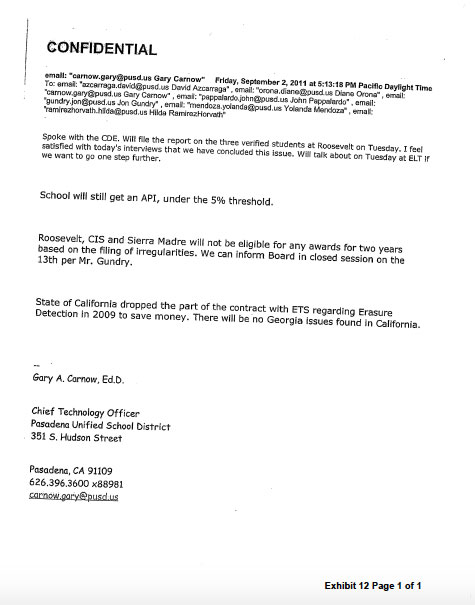 Gary Carnow, who was PUSD’s Chief Technology Officer, wrote in a September 2, 2011 email to six PUSD administrators, “There will be no Georgia issues found in California.” (Photo: CCEJAM white paper)
Gary Carnow, who was PUSD’s Chief Technology Officer, wrote in a September 2, 2011 email to six PUSD administrators, “There will be no Georgia issues found in California.” (Photo: CCEJAM white paper)
Carnow’s comment refers to the events that transpired at Parks Middle School in Pittsburgh, Georgia, starting in 2006. More than 35 teachers, principals and administrators were eventually named in an indictment that laid out widespread cheating. In the end 11 teachers were convicted of racketeering and other charges. They were found guilty of intimidating and retaliating against whistleblowers, tactics similar to those alleged in Pasadena.
At one point in Georgia, an investigator presented preliminary evidence of cheating to the school superintendent, whose response was to ask if there was any more evidence. Similarly, in Pasadena, Chief Human Resources Officer Yolanda Mendoza told Jacques that she needed “concrete evidence” of her allegations.
In Georgia, Tameka Grant, an early whistleblower, was transferred to another school against her wishes. At Madison Elementary School in Pasadena, at least 21 certified employees have similarly been transferred or have otherwise left their positions since Ruelas became principal. Madison has also seen the much-publicized case of first-grade teacher Patricia Guzman. After Guzman reportedly sent an email to Ruelas asking him to be respectful to staff, Ruelas accused Guzman of abusing a child. As a result, she was put on administrative leave in September 2015. Neither the Pasadena Unified School District nor the Pasadena Police Department found any evidence of child abuse. Guzman was allowed to return to work in February 2016 and has since spoken publicly about what she calls her unfair treatment by Ruelas.
There have been reports of cheating in dozens of other cities. A 2011 USA Today report found more than 1,500 testing anomalies in six states and the District of Columbia. In June 2012, a school superintendent in El Paso pleaded guilty to steering a no-contract bid to a woman he was romantically involved with and to falsely inflating student test scores. Other longtime educators in the city were arrested on charges related to cheating, with two other administrators pleading guilty to conspiracy to commit fraud. Earlier this year in Philadelphia, two former school district educators pleaded guilty to criminal charges related to cheating on standardized tests. Eight educators in total were accused of changing student answers, giving students answers and reviewing test questions prior to the test. The list goes on.
The rise in standardized-test cheating is not the result of a few bad apples in the education system. Berliner notes that the temptation to cheat in such high-stakes situation is human nature. “People cheat, if a lot of money is involved,” he says. NCLB provisions held that teachers and administrators could lose their jobs over low test scores, or see their school closed or taken over. As the New York Times reported, school districts around the country linked “teachers’ bonuses to student improvement on state assessments,” with some districts tying performance to tenure decisions.
According to the National Center for Education Statistics, “Total expenditures for public elementary and secondary schools in the United States amounted to $620 billion in 2012-13, or $12,296 per public school student enrolled in the fall.” In California, public schools receive about 14 percent of their funding from the federal government. The rest comes from the state, property taxes and other local funding.
According to the American Statistical Association, most educational assessment studies find that teachers account for between 1 and 14 percent variability in test scores. Most variability comes from a student’s environment and what happens outside of school. So holding teachers responsible and tying their pay to testing scores is “absolutely ludicrous,” Berliner says.
Ruelas’ Reputation and What’s Ahead for Pasadena
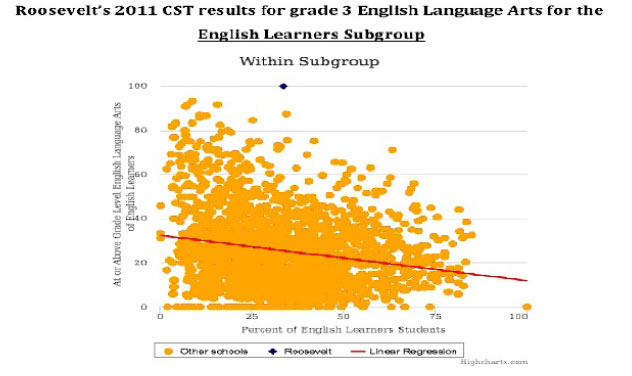 This graph shows Roosevelt’s 2011 English Language Arts results for third-grade English-language learners. Roosevelt’s was by far the only class in the state to have ESL students test at 100 percent proficiency. (Image: CCEJAM white paper)
This graph shows Roosevelt’s 2011 English Language Arts results for third-grade English-language learners. Roosevelt’s was by far the only class in the state to have ESL students test at 100 percent proficiency. (Image: CCEJAM white paper)
Comparing Roosevelt’s test scores after 2013 is a challenge, as the state’s Department of Education recently changed the type of test taken, from STAR to the Smarter Balanced Assessment Consortium (SBAC) test. SBAC tests are computer-based assessments; they replaced the paper-based STAR tests. There were no state test scores in 2014 as schools transitioned to the new system. Roosevelt’s test scores dropped from a high of coming in at third out of 18 elementary schools in 2011, to fourteenth out of 18 in 2015.
Despite the drop, Ruelas was widely lauded for Roosevelt’s standardized test scores. In November 2015, the Pasadena Independent printed a letter from Superintendent McDonald to the community highlighting Ruelas’ “tremendous success” at Roosevelt. McDonald notes the similarity in characteristics between the two schools, before listing Ruelas’ accomplishments. “Recently, Roosevelt received the honor of being named a California Distinguished School because of the excellent progress in student achievement among all groups of students,” he writes. After the 2011 cheating was admitted to the California Department of Education, Roosevelt was stripped of its distinction as a national Blue Ribbon School.
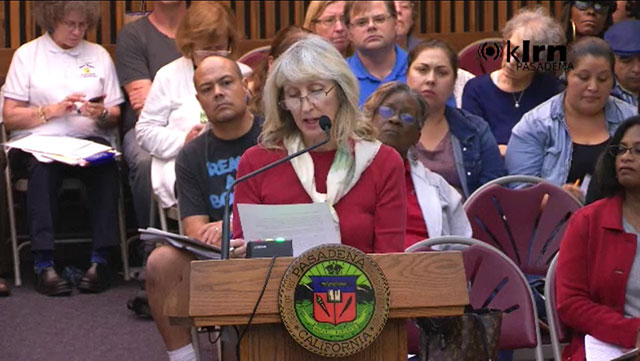 Retired teacher Julie Romero McKune spoke at the October 27, 2016 PUSD Board meeting, where she called on the district to look into cheating allegations under Principal Ruelas. (Photo: PUSD Board Meeting screenshot)
Retired teacher Julie Romero McKune spoke at the October 27, 2016 PUSD Board meeting, where she called on the district to look into cheating allegations under Principal Ruelas. (Photo: PUSD Board Meeting screenshot)
One of the more startling illustrations in the CCEJAM paper graphs the 2011 testing scores of Roosevelt’s ELL students. Roosevelt’s third-grade class was the only one in the state to be 100 percent proficient. As CCEJAM notes, “No other third-grade class in the state” had more than 20 percent of ESL students come close to that level. Scores for these students in 2012 and 2013, when they were in fourth and fifth grade, dropped precipitously.
At the October 27 school district board meeting, Gronemeier was not the only person to ask the school district for an investigation into Ruelas. Several parents, teachers and other community members went before the board to air their concerns.
“This is a public school and district and we demand transparency now,” said Julie Romero McKune, a retired teacher. “I insist that all the board members do their best to explore all options to find out the truth.”
More than one speaker referenced a petition submitted to the Pasadena Unified School District board and superintendent, asking for Ruelas’ removal as Madison’s principal. More than 300 community members and almost 200 parents, representing about 40 percent of Madison Elementary parents, signed the petition.
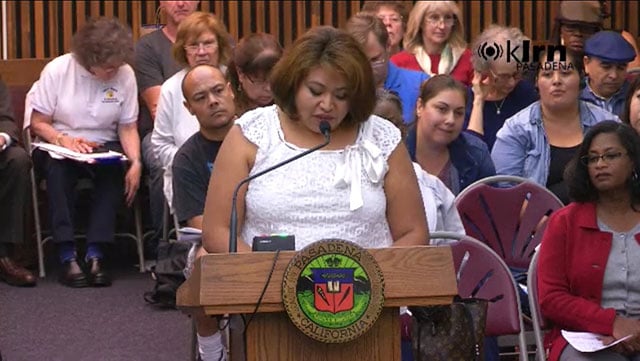 Julieta Aragon spoke out against Ruelas at the October 27, 2016 PUSD board meeting. Aragon used to have two children at Madison Elementary School, but she transferred them to another school in the district. (Photo: PUSD Board Meeting screenshot)
Julieta Aragon spoke out against Ruelas at the October 27, 2016 PUSD board meeting. Aragon used to have two children at Madison Elementary School, but she transferred them to another school in the district. (Photo: PUSD Board Meeting screenshot)
After Gronemeier’s statement, Pasadena Unified School District board member Adrienne Ann Mullen asked Chief Academic Officer Shawn Bird to clarify whether the state had already addressed the cheating claims. “The school did lose their API that year, however the [California Department of Education] found inconclusive evidence,” Bird said. The white paper, however, presents new teacher testimony that cheating occurred just last year at Madison.
Neither the Pasadena board nor Superintendent McDonald wanted to comment on these new allegations. Whether or not they will take action remains to be seen, but it is worth noting who really suffers amid the teacher turnover and reports of intimidation: the students.
“We as a community cannot stand by and allow this to happen just because the children are of a certain demographic,” McKune said.
Julieta Aragon, a member of CCEJAM and a former parent of Madison Elementary students who transferred her children to McKinley Elementary School, elicited applause and even cheers after her statement to the board. “I hope that this information helps you resolve any thoughts that you may have about who is telling the truth. Here the facts do not lie,” she said of the white paper. “It’s been more than a year since my nightmare started. How much longer do we have to wait for you to do your job?”
Press freedom is under attack
As Trump cracks down on political speech, independent media is increasingly necessary.
Truthout produces reporting you won’t see in the mainstream: journalism from the frontlines of global conflict, interviews with grassroots movement leaders, high-quality legal analysis and more.
Our work is possible thanks to reader support. Help Truthout catalyze change and social justice — make a tax-deductible monthly or one-time donation today.